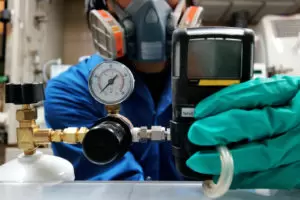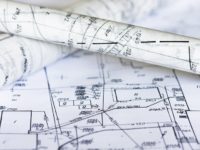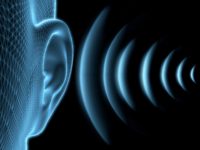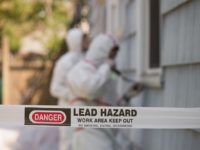
Instrumentation calibration technicians maintain, test, and repair electronic scientific equipment in laboratories and manufacturing facilities. They earned a median salary of $69,210 as of May 2022, per the BLS. Updated 2024 data may vary slightly. The role typically requires an associate degree in industrial engineering or electronics technology, along with strong technical skills, attention to detail, and knowledge of safety protocols when working with sensitive equipment in confined spaces.
If you've ever wondered who keeps the complex scientific equipment running in research labs, pharmaceutical facilities, or manufacturing plants, the answer is instrumentation calibration technicians. They're the specialists who ensure that every piece of electronic equipment-from incubators to centrifuges to precision measurement devices-functions accurately and safely.
These technicians work at the front line of monitoring and repairing electronic scientific equipment, sometimes working in confined spaces where precision and safety awareness are paramount. It's technical work that doesn't require you to understand the complex scientific research being conducted, but you'll need a solid grasp of electronics, calibration principles, and equipment functionality.
What Does an Instrumentation Calibration Technician Do?
Working with electronic equipment in scientific environments, instrumentation calibration technicians monitor, examine, and test commonly used specialist electronics. They perform basic calibrations to ensure equipment functions properly and meets required specifications. You'll find these professionals in a wide range of laboratory environments-chemical analysis, biotechnology, medical research, pharmaceuticals, and genetics labs-but always with similar core responsibilities.
Here's what makes this role unique: you're required to understand electronics and instrument function without necessarily understanding the scientific testing they're used for. Your focus is on functional efficiency and accuracy. It's your responsibility to provide ongoing monitoring of the equipment that researchers use every day.
Typical equipment includes: incubators, thermometers, centrifuges, spectrophotometers, pH meters, pressure gauges, and flow meters. Sometimes this requires entering confined spaces where there's a risk of injury, which is why knowledge of health and safety practices in labs and production areas is paramount. Your role often includes safety checks and efficiency calibration.
Beyond hands-on technical work, you'll have administrative duties, including report writing, communicating with research teams, and preparing requisition orders for replacement parts. If repairs exceed your expertise, you'll coordinate with specialist repair technicians. IT skills-particularly in using specialized calibration software-are a significant part of this role and are typically learned on the job.
Where Does an Instrumentation Calibration Technician Work?
There's limited specific data on instrumentation calibration technicians, but they're classified as electromechanical technicians for statistical purposes. These professionals work in diverse environments beyond scientific laboratories and the environmental sector. According to Payscale.com, most employees in this field work in electrical engineering and the medical device sectors.
Major employment sectors include:
The largest employer of this type of technician is the semiconductor and electronic components manufacturing industry. They work in environments that ensure the machinery used to manufacture complex scientific parts performs as expected.
Medical machine manufacturing is the second-largest employment area, with technicians performing roles similar to those in semiconductor production but for medical devices and electronic equipment. This sector employs about 10% of all electromechanical technicians. Transportation engineering employs 9%, engineering services 8%, and machinery manufacturing 7%.
Engineering services most closely resemble the work of those in lab environments with scientific instrumentation. This work requires technical and engineering expertise common across all industries, rather than specialized scientific knowledge.
If you're interested in related technical careers, you might also explore opportunities as environmental sampling technicians or geotechnical lab technicians, which involve similar technical skills in laboratory and field settings.
What Is the Average Instrumentation Calibration Technician Salary?
According to the BLS, instrumentation and calibration technicians-who fall under the broader BLS category of electrical and electronic engineering technologists and technicians-earned a median salary of $69,210 as of May 2022. Updated 2024 data may vary slightly, but this provides a solid baseline for salary expectations.
The primary drivers of higher salaries are experience and certification, with technicians specializing in more complex equipment commanding greater demand and compensation. Entry-level positions typically start in the $40,000-$50,000 range, while experienced technicians with advanced certifications can earn $85,000-$100,000 or more.
Salary by Experience Level
Note: The table below provides typical salary ranges based on 2022 BLS baseline data. These are estimates that may vary by region, industry, and employer. Updated 2024 figures may differ.
| Experience Level | Years of Experience | Typical Salary Range | Key Qualifications |
|---|---|---|---|
| Entry-Level | 0-2 years | $42,000 - $52,000 | Associate degree, basic calibration knowledge, learning equipment |
| Mid-Career | 3-7 years | $58,000 - $72,000 | Specialized certifications, independent troubleshooting, multiple equipment types |
| Experienced | 8-15 years | $75,000 - $88,000 | Advanced certifications, complex systems, training responsibilities |
| Senior/Specialist | 15+ years | $90,000 - $105,000+ | Expert-level certifications, specialized equipment, supervisory role |
Instrumentation Calibration Technician Jobs & Job Description
Instrumentation calibration technician positions generally require a background in laboratory science or technical electronics. Here's what you can expect in terms of daily responsibilities and job duties.
Typical Day-to-Day Responsibilities
An instrumentation calibration technician at the beginning of their career may be tasked with the following duties:
- Maintain, test, and repair a variety of instrumentation and test equipment according to manufacturer specifications and industry standards
- Provide on-site and in-laboratory calibration services on devices ranging from basic thermometers to complex analytical instruments
- Set up test equipment and conduct performance and reliability tests on equipment to ensure accuracy
- Support senior calibration technicians on general laboratory equipment calibrations and learn advanced techniques
- Follow safety procedures and industry best practices to ensure your safety and that of others working in the facility
- Modify performance and operation of component parts and circuitry using test equipment and precision instruments
- Build customer relationships by offering support for customers' calibration and maintenance programs
- Work with vendors and order parts necessary for machinery repair, managing inventory of calibration standards
- Perform preventative maintenance on test equipment to minimize downtime and extend equipment life
- Document all calibration activities, test results, and equipment status in compliance with ISO and other quality standards
Career Progression Path
As you gain experience, you'll typically advance through several stages:
Junior Technician (0-2 years): Learning equipment under supervision, performing basic calibrations, assisting with maintenance tasks, and building fundamental troubleshooting skills.
Technician II (3-5 years): Working independently on routine calibrations, handling more complex equipment, and beginning to specialize in particular instrument types or industries.
Senior Technician (6-10 years): Leading calibration projects, training junior staff, handling the most complex equipment issues, and potentially earning advanced certifications like ISA Certified Calibration Technician.
Specialist or Supervisor (10+ years): Managing calibration programs, overseeing teams, developing procedures, and serving as the technical expert for your facility. Some technicians move into quality assurance, metrology management, or field service engineering roles.
What Is the Job Demand for Instrumentation Calibration Technicians?
According to updated BLS projections, job growth for this occupation is expected to be 1% from 2022 to 2032, slower than the average for all occupations. This modest growth rate is primarily due to increased automation of some routine calibration tasks.
However, this figure doesn't tell the whole story. While automation handles routine calibration tasks, the increasing complexity of scientific and medical equipment means there's steady demand for skilled technicians who can troubleshoot problems, validate automated systems, and work with cutting-edge instrumentation. Industries such as biotechnology, pharmaceutical manufacturing, and advanced electronics continue to require qualified calibration professionals who understand both the technical and regulatory aspects of equipment maintenance.
The best opportunities will be for technicians with certifications, specialized knowledge in regulated industries (pharmaceuticals, medical devices), and skills in modern calibration management software and automated systems.
What Are the Education Requirements to Become an Instrumentation Calibration Technician?
The highly technical nature of this role means most employers require you to hold a relevant associate's degree. Let's break down the educational pathways and what you'll need at each stage.
High School Preparation
If you're still in high school and interested in this career, you'll want to focus on specific subjects. Make sure you achieve strong grades in math and information technology, but also in the hard sciences-chemistry, biology, or physics. These courses provide the foundation you'll need for technical programs and help you understand the scientific context of the equipment you'll work with.
Associate Degree Options
Most entry-level positions require an associate's degree in one of these areas:
| Degree Program | Typical Duration | Key Coursework | Best For |
|---|---|---|---|
| Industrial Engineering Technology | 2 years | Electronics, instrumentation, quality control, manufacturing systems | Manufacturing and production environments |
| Electronics Technology | 2 years | Circuit analysis, digital electronics, microprocessors, troubleshooting | General calibration work across industries |
| Instrumentation Technology | 2 years | Calibration principles, measurement systems, process control, automation | Specialized calibration focus, ideal preparation |
| Applied Science - Electronics | 2 years | Applied physics, electrical systems, lab practices, technical documentation | Lab-based calibration roles |
You'll find that community colleges in your local area offer these programs more often than large state universities. Some colleges offer specific Instrument Technology Associate of Applied Science degrees that train you in the fundamentals of electrical engineering and safe practices.
Specialized Knowledge for Lab Work
If you wish to work in laboratory instrumentation calibration-especially in fields like biotechnology, genetics, medical research, or microbiology-you may need a basic understanding of the scientific principles of the labs where you'll work. Consider pursuing minors and electives in relevant sciences, though certification in a specific field is often the preferred path to access such niches in today's employment market.
They're not always necessary, so check industry requirements in your local area for further details due to the broad nature of this type of work.
Do You Need a Bachelor's Degree?
Full bachelor's degrees and postgraduate courses aren't necessary, as this is an applied science position rather than a teaching or research role. If you wish to teach this subject or move into metrology research, you should pursue a bachelor's degree or equivalent in engineering technology with a teaching credential.
Professional Certifications That Boost Your Career
While not always required for entry-level positions, certifications can significantly improve your salary potential and job opportunities. Here are the most valuable credentials in the field:
| Certification | Issuing Organization | Requirements | Career Value |
|---|---|---|---|
| Certified Calibration Technician (CCT) | International Society of Automation (ISA) | 1+ years experience, pass exam covering measurement principles, calibration procedures, documentation | Industry-recognized standard, increases salary 10-15%, required by many employers |
| Certified Quality Technician (CQT) | American Society for Quality (ASQ) | 3+ years experience in quality-related field, pass comprehensive exam | Demonstrates quality system knowledge, valuable for pharmaceutical and medical device sectors |
| NIST Traceable Calibration | Various accredited labs (A2LA, NVLAP) | Training in NIST traceability standards, competency assessment | Essential for regulatory compliance environments (FDA, ISO 17025) |
| Manufacturer-Specific | Equipment manufacturers (Fluke, Tektronix, Agilent, etc.) | Varies by manufacturer, typically training course plus practical assessment | Demonstrates expertise with specific equipment lines, opens specialized opportunities |
Many employers will pay for certification training as part of your professional development, especially if you're working in regulated industries where calibration standards are critical to compliance.
Instrumentation Calibration Technician - Related Degrees
Technology and Automation in Modern Calibration
The field is evolving rapidly with technological advances. Here's what you should know about how technology is changing the work:
Automated calibration systems now handle many routine tasks, but they require skilled technicians to program, validate, and troubleshoot them. Rather than replacing technicians, automation has shifted the role toward more complex problem-solving and system management.
Calibration management software has become essential, allowing you to track equipment status, schedule maintenance, generate reports, and maintain compliance documentation. Systems like Fluke MET/CAL, Beamex CMX, and similar platforms are now standard tools you'll use daily.
Wireless and IoT-enabled instruments are increasingly common, requiring technicians to understand network connectivity, data security, and remote calibration verification. This adds an IT component to traditional calibration skills.
Regulatory requirements continue to tighten, particularly in the pharmaceutical, medical device, and food safety industries. Knowledge of FDA regulations, ISO/IEC 17025 standards, and Good Manufacturing Practices (GMP) is becoming more valuable.
What's the Work-Life Balance Like?
Most instrumentation calibration technicians work standard business hours, typically Monday through Friday, 8 AM to 5 PM. However, the schedule can vary depending on your work environment:
Lab-based positions generally offer predictable schedules with minimal overtime. You'll work in climate-controlled environments with consistent hours.
Field service technicians may travel to client sites, which can mean occasional overnight trips or extended workdays when serving clients in different time zones. Some positions involve 10-20% travel.
Manufacturing facilities sometimes require shift work to support 24/7 operations, though calibration technicians often work day shifts unless emergency repairs are needed.
On-call requirements are uncommon but can occur in critical industries such as pharmaceutical manufacturing and healthcare, where equipment downtime can have serious consequences.
Overall, it's a stable career with reasonable work hours, particularly compared to other technical fields. The work is methodical and detail-oriented rather than high-pressure, though you'll need to manage multiple projects and deadlines effectively.
Safety and Working Conditions
Safety is a critical aspect of this career. You'll work with electrical systems, sometimes in confined spaces or environments with chemical exposure. Understanding and following safety protocols isn't just important-it's essential for your wellbeing and career longevity.
Many facilities require knowledge of hazardous materials handling procedures, particularly in chemical or pharmaceutical labs. You'll receive training in proper personal protective equipment (PPE), lockout/tagout procedures for electrical safety, and confined-space entry protocols.
The physical demands are moderate. You'll spend time standing, crouching to access equipment in low positions, and occasionally lifting equipment or tools (typically 25-50 pounds). Dexterity and good hand-eye coordination are important for working with small components and precision instruments.
What Kind of Societies and Professional Organizations Do Instrumentation Calibration Technicians Have?
Joining professional organizations can significantly benefit your career through networking, continuing education, and staying current with industry standards. Here are the most relevant organizations for electrical and electronic engineering technicians:
- Institute of Electrical and Electronics Engineers (IEEE): The world's largest association in the industry, with 420,000 members across software development, medical engineering, physics, and many other technical disciplines. IEEE offers publications, conferences, and professional development resources specifically for technicians and technologists.
- Association for the Advancement of Medical Instrumentation (AAMI): Their mission is to develop and promote safer, better, and more efficient technology and machinery in the health industry. Particularly valuable if you work in medical device calibration or hospital equipment maintenance.
- International Society of Automation (ISA): While not listed in the original article, ISA is essential for calibration technicians. They offer the CCT certification, training programs, technical resources, and local chapters for networking and professional development.
- American Society for Quality (ASQ): Provides quality-focused certifications and resources particularly relevant to technicians working in regulated industries where calibration is part of quality assurance programs.
Frequently Asked Questions
Do I need a 4-year bachelor's degree to become an instrumentation calibration technician?
No, you don't need a bachelor's degree for most instrumentation calibration technician positions. An associate degree (2 years) in industrial engineering technology, electronics technology, or instrumentation technology is the standard educational requirement. Some technicians enter the field with a high school diploma or technical certificate and receive on-the-job training, though advancement opportunities may be limited without formal education. Bachelor's degrees are only necessary if you want to move into engineering roles, teaching, or advanced research positions.
What certifications are most valuable for instrumentation calibration technicians?
The most valuable certification is the Certified Calibration Technician (CCT) from the International Society of Automation (ISA), widely recognized across industries and known to increase your salary by 10-15%. The Certified Quality Technician (CQT) from ASQ is also highly regarded, especially in the pharmaceutical and medical device sectors. Additionally, NIST-traceable calibration training is essential for regulated environments, and manufacturer-specific certifications (Fluke, Tektronix, Agilent) demonstrate expertise with specific equipment lines. Many employers will pay for certification training as part of professional development.
Can instrumentation calibration technicians work remotely?
Generally, no. Instrumentation calibration is hands-on work that requires you to physically interact with equipment, perform tests, and make adjustments. You'll need to be on-site in laboratories, manufacturing facilities, or at client locations. However, some aspects of the job-like calibration documentation, report writing, scheduling, and calibration management software work-can be done remotely. Some experienced technicians in field service roles have flexible schedules, with administrative work performed from home, but calibration work must be performed on-site.
How long does it take to become an instrumentation calibration technician?
The timeline varies depending on your educational path. With an associate degree (the most common route), it takes 2 years of full-time study, followed by several months of on-the-job training to gain practical experience with specific equipment and procedures. If you pursue professional certification like the CCT, you'll typically need at least 1 year of work experience before you're eligible to test. From starting your associate degree to becoming a certified, independent technician, expect about 3-4 years total. Entry-level positions are available sooner, but reaching full competency and professional recognition takes several years of experience.
What's the difference between an instrumentation calibration technician and an electrical engineering technician?
While both work with electronic equipment, their focus differs significantly. Instrumentation calibration technicians specialize in testing, maintaining, and calibrating measurement and control instruments to ensure accuracy and compliance with standards. They focus on ensuring existing equipment operates correctly per specifications. Electrical engineering technicians play a broader role, including designing, building, testing, and troubleshooting electrical systems and equipment. They often work on the development and implementation of new systems rather than just maintaining existing ones. Instrumentation calibration is more specialized and quality-focused, while electrical engineering technology is more diverse and can involve product development, manufacturing support, or field engineering.
Key Takeaways
- Technical Role with Clear Entry Path: An associate degree in electronics, industrial engineering, or instrumentation technology is typically sufficient to enter this field, making it accessible without requiring a 4-year bachelor's degree. Most community colleges offer relevant programs.
- Stable Career with Steady Demand: While job growth is modest at 1% (2022-2032 projection), the increasing complexity of scientific and medical equipment ensures continued demand for skilled calibration technicians, particularly those with certifications and specialized knowledge.
- Salary Growth Through Specialization: Entry-level positions start around $42,000-$52,000, with median earnings of $69,210 as of May 2022. Experienced technicians with advanced certifications can earn $90,000-$105,000+. Certifications such as the ISA's CCT can increase salaries by 10-15% and are often employer-funded.
- Safety-Critical Work Environment: This role requires strict adherence to safety protocols, as you'll work with electrical systems, occasionally in confined spaces, and sometimes around hazardous materials. Safety training and awareness are essential aspects of the job.
- Technology Skills Are Increasingly Important: Modern calibration work involves calibration management software, automated systems, and IoT-enabled instruments. IT skills and willingness to learn new technologies are becoming as important as traditional electronics knowledge.
Ready to start your career in instrumentation calibration? Explore associate degree programs in electronics technology and industrial engineering to build the technical foundation you'll need for this precision-focused career.
2022 US Bureau of Labor Statistics salary and job growth projections for electrical and electronic engineering technologists and technicians reflect national data, not school-specific information. Conditions in your area may vary. Data accessed January 2026.






